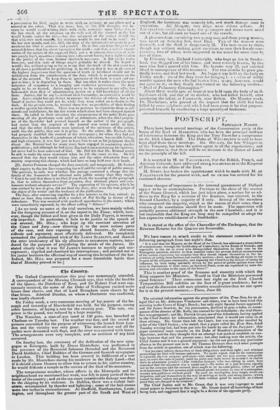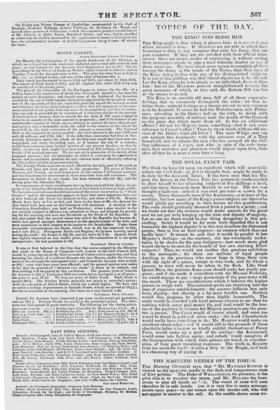The criminal information against the proprietors of the True Sun,
for an al- leged libel on Mr. Alderman Winchester and others, was to have been tried this morning in the Court of King's Bench; but mil); eight Special Jurors appeared; and Sir James Searlett, for the prosecutors, declined to pray a tales, in conse- quence of the absence of Mr. Kelly, the counsel for the defendants : the trial there- fore was postponed ; and Mr. Patrick Grant, one of the defendants, Laving applied to the Chief Justice for information, ascertained that it would not come on at these sittings. Mr. Grant then left the Court, but was soon after recalled by order of the Chief Justice ; who stated, that a paper called the True Sun, dated Tuesday evening last, had been put into his hands by one of the Jurymen: this paper contained some remarks on the Duke of Beaufort's prosecution of the Spectator, and the Jury thought that an attempt was made to establish an ana- logy between that and the present case; but after looking over the article, the Chief Justice said it was a general argument—he did not perceive any particular allusion to the present case in it. Sir Thomas Denman then read some passages from the article in question, one of which was the following. " Let jurymen inform themselves of their obligations and their right; and criminal proceedings for libel will become unknown. We again repeat, that tor the commission of injustice, the In assumes guiltiness—why should not tine jury assume non-guilti- ness, to serve the ends of justice, until the plain and right menus be accorded, to enable them to administer justice?—[The solicitor-Genera!, who was sitting in court, here remarked that the argument was a sound one.)—To arrive at a just decision. equally lair to the accusers and tine accused, there ought to be no auticipaion, either of guilt or of innocence. The law assumes guilt without proof; let juries, by way of counterpoise,. assume non-guiltiness without proof. By such an assumption, they simply avoid arn- ticipation, and put themselves in the way of arriving at truth, and doing justice ; which cannot be done, unless non-guiltiness of facts without proof be assumed, as without proof they are charged to be criminal." Tice Chief Justice said to Mr. Grant, that it was very improper to send round papers to Jurymen in this way. Mr. Grant denied all knowledge of their being sent, and suggested that it might be a device of the opposite party.
On Ftiday last, Prince George of Cambridge, accompanied by the Earl of Denbigh, Professor Babbage, Colonel Fielding, the Revetend Mr. Wood, and several other persons of distinction, visited the extensive printing establishment of Mr. Clowes, in Duke Street, Stamford Street; and were highly gratified at witnessing the facility produced by the application of steam in that particular line, the extraordinary number of 33,250 impressions being thrown off within the hour.



















 Previous page
Previous page